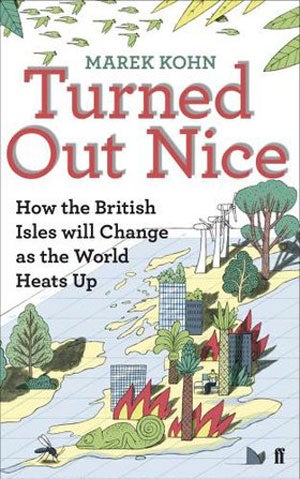Turned Out Nice, by Marek Kohn
A fascinating forecast for the next 100 years

Most of us have some idea of what climate change might have in store for the British Isles – we'll have a more Mediterranean climate, increased flooding, vineyards will flourish, malaria could reappear and so on. But it is about time we knew more, and Marek Kohn seems the right person to deliver chapter and verse. He is a talented writer who has tackled a range of social and scientific subjects.
In Turned Out Nice, his strategy is intriguing. He focuses on the changes likely to have taken place by 2100, on the basis that many children born around now will still be living then, and further brings the issues home by sketching in the effects of these changes upon seven distinctive habitats, from London to the Scottish glens and the remote Burren area of County Clare, via localities in Sussex, Suffolk, the Welsh Marches and the Yorkshire Dales.
Within this framework his approach is diffuse. Kohn travels far back into each location's history in order to scrutinise the challenges it faces, before presenting imaginative projections of its state at the century's end. On the South Downs, he segues between the legacy of Neolithic farming, forecasts for global cereal production and prospects for the rare early spider orchid. His account of London is sobering. The best guess is that the metropolis will become as much of a meteorological as a cultural hotspot, with summer temperatures regularly in the 40s. Parks will become largely denuded of grass and all remaining green space will be zealously conserved, while vigilant thermal surveillance satellites hunt down illegal air-conditioning plants.
There are ironies in these projections. In Suffolk, for example, higher sea levels might cut off Sizewell's nuclear reactors from the mainland, but would thereby make them more secure against terrorism. Yet a more fundamental paradox, and one which goes to the heart of this book, relates to the probabilities of radical government intervention, given the scenarios he outlines.
The scientific consensus is well rehearsed. It is easy to heat up the biosphere, but so far there is no practical technology for cooling it down. We are very likely at a tipping point, and prudence therefore dictates drastic reductions in greenhouse-gas emissions over the next 10 years. Kohn supports this argument but the implications of his mosaic of extrapolations are more ambiguous and temper his warnings and injunctions.
The fact is, many regions are likely to become merely pleasantly warm. Life in the Yorkshire Dales 80 years hence sounds very nice indeed. Even these gentle temperature rises might be curbed further. A counter-intuitive aspect of climate change relates to the disruption of the heating effects of Atlantic currents, notably the Gulf Stream, which we currently enjoy. This could manifest itself during the 22nd century and the resulting cooling would offset general global temperature rises.
Reprieve for large parts of the British Isles could weaken our will to reduce carbon emissions, and undermine the impetus of our international interventions – the latter's impact diminishing, in any case, as our global influence wanes. Our main response to climate change might be draconian immigration controls, prompted by torrents of refugees from more catastrophic changes elsewhere.
In the meantime, Kohn's exhaustive research offers up a series of fascinating insights. One especially enjoyable narrative strand is his explanation of why individual species of fauna and flora could vanish and what might appear to replace them – including the reintroduction of lynx and wolves, if re- wilding initiatives are successful. More generally, his readiness to delve into diverting minutiae during his journeys around his chosen habitats constantly enlivens his meticulous unravelling of the consequences of our excesses upon our home turf.
Subscribe to Independent Premium to bookmark this article
Want to bookmark your favourite articles and stories to read or reference later? Start your Independent Premium subscription today.

Join our commenting forum
Join thought-provoking conversations, follow other Independent readers and see their replies